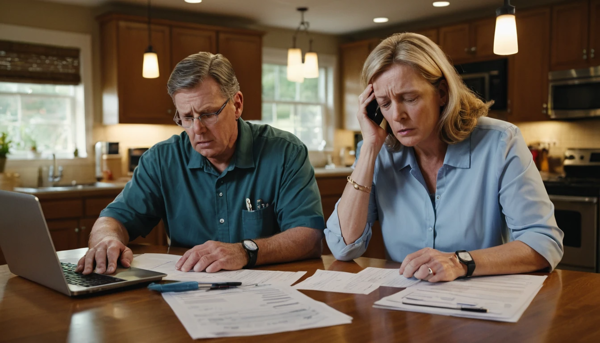How to negotiate with creditors easily and confidently. Discover proven strategies to lower payments, reduce stress, and take control of your debt.
How to Negotiate With Creditors – Expert Tips for Peace of Mind
Are creditors calling nonstop and making your life stressful?
You’re not alone—and yes, you can take control. Negotiating with creditors is smart money management. Many people don’t realize they have more power than they think.
So, if you’re drowning in bills and wondering how to negotiate with creditors, this guide is exactly what you need. From scripts to mindset shifts, we’ll walk through everything to help you breathe easier again.
Why Negotiating With Creditors Matters
When you’re struggling to keep up with bills, communication is key.
Creditors aren’t monsters—they’re businesses. And guess what? They’d prefer to work with you than send your debt to collections.
Here’s why it matters to speak up early:
- Avoid late fees and penalties
- Stop harassing phone calls
- Prevent damage to your credit score
- Gain control over your financial plan
- Reduce your overall stress and anxiety
You might even get lower monthly payments or waived interest—but only if you ask.
The Best Time to Reach Out to Creditors
Timing is everything.
Don’t wait until your account is severely past due. The earlier you contact them, the more options you’ll have.
Ideal times to negotiate:
- When you know you’re going to miss a payment
- After losing a job or facing a financial emergency
- Before your account is charged off (usually 180 days past due)
➡️ Being proactive shows responsibility—and that helps you negotiate better terms.
What You Need Before the Call
Preparation = power.
Before you speak to any creditor, make sure you have these items ready:
- Recent bills or statements
- Your monthly budget
- Current income vs. expenses
- Notes on what you can realistically offer
It’s also helpful to write a quick script or talking points so you don’t freeze up.
Sample Script You Can Use
Need help with what to say? Try this friendly but direct approach:
“Hi, I’m calling because I’m going through a difficult time financially. I want to continue paying my debt, but I can’t afford the current payments. Can we work out a new arrangement, such as a lower monthly payment or reduced interest rate?”
Always stay calm, polite, and honest.
The person on the other end is just doing their job—and if you treat them with respect, they’re more likely to help.
Common Negotiation Options
Let’s break down your choices. Here’s what creditors often offer:
| Negotiation Option | What It Means | Why It Helps |
|---|---|---|
| Lower Interest Rate | Reduced APR on your balance | You pay less in total and monthly |
| Temporary Hardship Plan | Short-term payment reduction | Offers relief while you recover |
| Payment Deferral | Skip 1–2 payments without penalty | Helps during job loss or emergency |
| Lump Sum Settlement | Pay less than you owe to settle the account | May save you thousands |
| Extended Repayment Plan | Longer term with smaller monthly payments | Easier to manage monthly cash flow |
Not every creditor will offer all of these—but it never hurts to ask!
⚠️ What to Avoid Saying
Some words can hurt your negotiation. Here’s what not to say:
- “I just don’t feel like paying.”
- “I’ll declare bankruptcy if you don’t help.”
- “It’s your fault I’m in this mess.”
- “I want to cancel my card right now.”
Instead, use calm, solution-focused language.
Can You Negotiate by Email or Letter?
Yes, and in some cases, it’s even better.
Putting things in writing gives you a paper trail and more time to think before responding.
When to use email or letter:
- You’re nervous about phone calls
- You want a formal agreement
- You’re negotiating a settlement
Just be sure to stay professional and clear.
How to Work With a Debt Counselor
Feeling overwhelmed? You don’t have to do this alone.
Nonprofit credit counselors can:
- Help you create a budget
- Talk to creditors on your behalf
- Set up a debt management plan (DMP)
- Offer free or low-cost advice
Find legit help through:
- National Foundation for Credit Counseling (NFCC)
- Financial Counseling Association of America (FCAA)
Be sure to avoid shady “debt relief” scams that ask for large upfront fees.
What Happens to Your Credit Score?
Let’s be real: your credit score might take a hit in the short term. But negotiating can actually help in the long run.
How it affects your credit depends on:
- Whether you’ve missed payments already
- If the new terms involve settling for less than owed
- Whether the account stays open or is closed
✅ But it’s better to have a manageable payment than default entirely.
What If a Creditor Refuses to Work With You?
Sometimes creditors say no. Don’t panic. Here’s what you can do:
- Ask to speak with a supervisor
- Try again in a few weeks
- Offer a different solution
- Get help from a credit counselor
Persistence can pay off. Just be polite and consistent.
How Often Should You Follow Up?
Stay on top of it!
If you make a deal, always get it in writing—and check in regularly:
- Before due dates
- After making payments
- If your situation changes
Set calendar reminders so nothing slips through the cracks.
Should You Agree to a Lump Sum Settlement?
It can be a great option—but it comes with pros and cons:
| Pros | Cons |
|---|---|
| Settle debt for less than full amount | Credit report may show as “settled” |
| End collection calls | May require a large upfront payment |
| Peace of mind | Potential tax liability on forgiven debt |
Only agree if you’re confident you can pay the amount in full—and always get a written agreement first.
Tips for Staying Calm During the Call
Nervous about talking to a creditor? Here are some grounding tips:
- Take a deep breath before calling
- Write down your goals and budget first
- Remember: You’re in control of the conversation
- Don’t agree to anything on the spot—ask for time to review
- Keep it respectful and professional, even if they’re not
You have the right to negotiate with dignity.
Should You Use a Debt Settlement Company?
Be cautious here. Many companies promise the world but deliver stress.
Red flags to watch out for:
- High upfront fees
- Promises to “erase” your debt
- Asking you to stop paying creditors
Instead, try to negotiate directly—or use a nonprofit credit counseling agency.
✅ What to Do After Reaching an Agreement
Congrats! You’ve made progress. Now seal the deal:
- Get everything in writing
- Check your credit reports
- Make payments on time
- Follow up regularly
- Celebrate small wins
Staying consistent builds your confidence—and keeps the momentum going.
Final Thoughts: Take Back Control Today
Negotiating with creditors might seem scary at first. But it’s really empowering.
You’re making a plan that works for everyone, not just you.
With the right preparation, tone, and follow-up, you can lessen your debt. This will make you feel better.
Remember:
- Be honest
- Be respectful
- Don’t wait too long
- You have more power than you think
❓FAQs
What is the best way to ask creditors to lower payments?
Tell them about your financial struggles and ask for a payment plan that’s easier. Be polite and clear.
Can I settle debt with a credit card company myself?
Yes, you can talk about paying a lump sum or lowering interest rates on your own.
How do I get a hardship plan from my creditor?
Call them and ask for a hardship program. Be ready to share your budget and explain why you need it.
Is it better to call or write to a creditor?
Calling is quicker. Writing keeps a record of your talks.
Will debt negotiation hurt my credit score?
It might go down a bit. But it’s better than not paying or defaulting.
References
https://www.consumer.ftc.gov/articles/dealing-debt-collectors
https://www.nfcc.org/
https://www.consumerfinance.gov/consumer-tools/debt-collection/






Leave a Reply